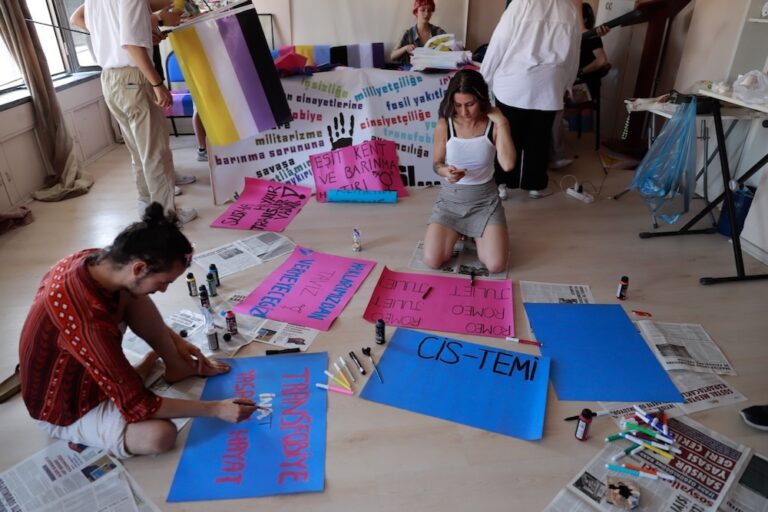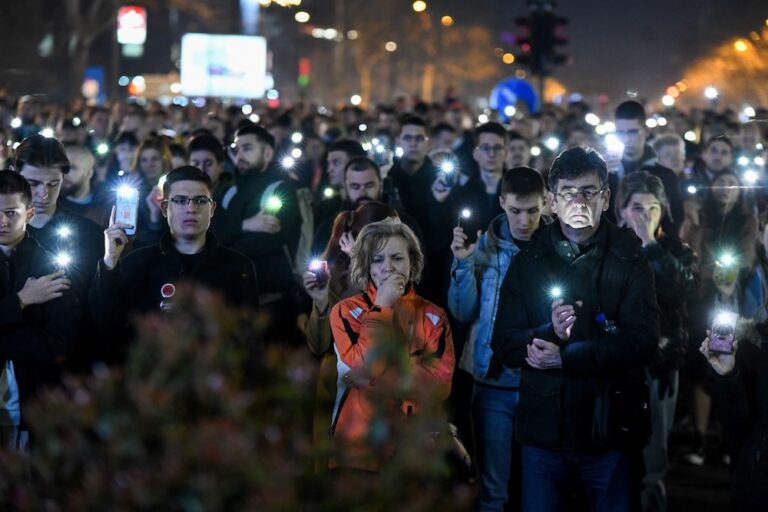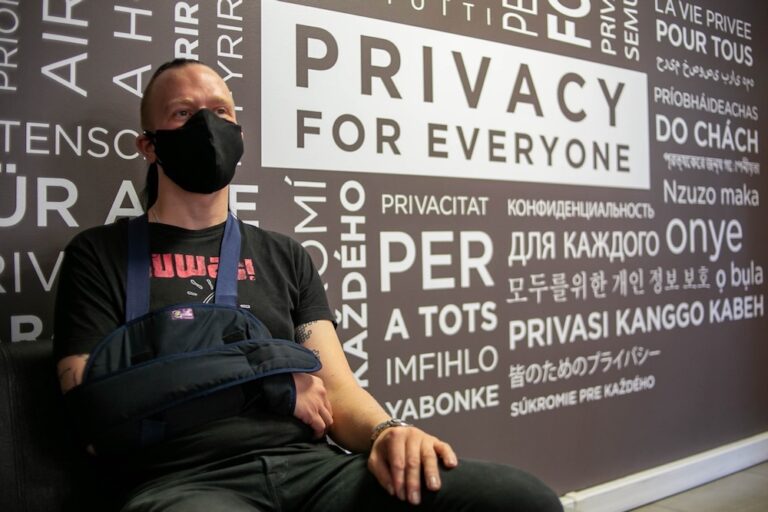June 2024 in Europe and Central Asia: A free expression round-up produced by IFEX's Regional Editor Cathal Sheerin, based on IFEX member reports and news from the region.
Julian Assange freed; Evan Gershkovich on trial; anti-LGBTQI+ legislation and “politically-motivated terror” in Georgia; welcome developments in the fight against impunity and in defence of civic space; “foreign agents” bill withdrawn in Republika Srpska.
Julian Assange is free at last
Julian Assange, one of the most high-profile prisoners of our time, is free.
On 24 June, after reaching a plea deal with the US, the Wikileaks publisher was released on bail from the UK high security prison where he had spent the previous five years.
On 26 June, at a court in the US Pacific island territory of Saipan, Assange pleaded guilty to violating US espionage law and was sentenced to time served. He then flew to his native Australia to be reunited with his family.
Significantly, the judge in Saipan concluded that no-one had been physically injured as a result of Wikileaks’s dissemination of information. (Wikileaks had faced frequent accusations that its publishing activities had, or would, cost lives.)
During his time behind bars, Assange fought a long battle against extradition to the US, where he faced up to 175 years in prison if convicted on 17 charges under the Espionage Act and one under the Computer Fraud and Abuse Act.
He faced these charges solely because he published information in the public interest. In doing so, he exposed war crimes.
Before his arrest in 2019, Assange had been given asylum in the Ecuadoran embassy in London. This lasted from 2012 until 2019, when his asylum was withdrawn and British police arrested him.
While Assange was still in the embassy, it is reported that the CIA under former President Trump discussed abducting and assassinating him.
Assange’s release was welcomed by IFEX members, who emphasised that he should never have been in prison in the first place.
The European Federation of Journalists (EFJ) reminded us that, despite Assange’s release, “the US has not given up intimidating journalists”. As EFJ’s president, Maja Sever, said: “By refusing to drop the Espionage Act charges and forcing Assange to plead guilty to a crime of conspiracy that he did not commit, the US is keeping up the pressure on all journalists who would use information relating to US national defence”.
Several IFEX members, including ARTICLE 19, the Committee to Protect Journalists (CPJ), the EFJ, Index on Censorship, PEN International, PEN Norway and Reporters Without Borders (RSF) spent many years advocating for Assange to be released and for the charges against him to be dropped.
Evan Gershkovich on trial
As the plane carrying Julian Assange was touching down in Australia, US journalist Evan Gershkovich was in court in Russia for the first hearing in his trial on bogus espionage charges.
Gershkovich, who is accused of gathering information on behalf of the CIA, has already spent 14 months in pre-trial detention and faces up to 20 years in prison if convicted.
President Putin has signalled that he is considering using Gershkovich as part of a prisoner swap deal which, as Rachel Denber from Human Rights Watch (HRW) writes, makes it clear that “this trial is a cruel performance that has nothing in common with justice”.
The Russian authorities claim that Gershkovich was collecting “secret information” on a Russian tank factory when he was arrested in March 2023, one year into Russia’s invasion of Ukraine. Since the war began, the Russian authorities have prosecuted nearly 500 people for sharing information that challenges the Kremlin narrative on the conflict.
Anti-LGBTQI+ legislation, “politically-motivated terror”
Georgia continues to follow Russia’s bad example on human rights and civil society.
Last month, its parliament adopted the Russia-style “foreign agents” law; this month, the ruling party (Georgian Dream) tabled a broad package of anti-LGBTQI+ legislation.
This legislation includes bans on: same-sex marriage; gender-affirming surgeries; legal gender recognition; LGBTQI+ adoption; and “popularising” LGBTQI+ in the media, workplaces, schools, and at protests. Those convicted of “popularising” LGBTQI+ would face fines and possible prison sentences.
Journalist Shota Kincha has provided an excellent overview for OC Media of the legislation within its current political context.
Due to the tense political climate, Tbilisi Pride said in June that no physical events would be organised for Pride Month. The organisation also says it expects the period between now and the parliamentary elections in October to be “filled with physical violence encouraged by the government and rhetoric filled with hate and hostility”.
Recent months in Georgia have seen violent crackdowns on protests against the “foreign agents” law. Several critics of the government say that they have been the targets of organised campaigns of intimidation.
One particularly disturbing case is that of civic activist Zuka Berdzenishvili. On 11 June, after being publicly accused of “politically-motivated terror” by the Speaker of the Georgian Parliament, the government critic was beaten so badly by a group of men that he had to be hospitalised.
Following the attack, 25 Georgian civil society organisations (CSOs) issued a statement calling on the authorities to stop inflicting violence on Georgia’s citizens.
Belarus
June in Belarus saw some high profile journalists and opposition voices sentenced to long prison terms.
On 20 June, Franak Viacorka, exiled political adviser to the exiled opposition leader Sviatlana Tsikhanouskaya, was handed a 20-year prison sentence in absentia. He was convicted on various charges, including treason, “creating an extremist organisation” and defaming the president.
In early June, freelancer Alena Tsimashchuk was sentenced to five years in prison after being convicted of “discrediting the Republic of Belarus”, “inciting hostility or discord”, and “participating in an extremist organisation”.
But, just as the repression continued, so did efforts to hold the Belarusian government to account.
June saw Freedom House testify at the US Helsinki Commission alongside Tsikhanouskaya on the plight of political prisoners in Belarus. The hearing can be viewed here.
The Belarusian Association of Journalists (BAJ) continues to be a source of invaluable information on the situation for independent press in journalism in Belarus. This month, it published a report on media repression during the first four months of 2024, which saw: four journalists sentenced to between 2.5 and four years in prison (mostly on “extremism” charges); criminal cases filed against another seven journalists, five of whom are in exile; five cases of arbitrary detention; and at least seven online media projects or websites classed as “extremist organisations” and blocked.
On 31 May, the Supreme Court in Serbia ruled that exiled Belarusian journalist Andrei Hniot could be extradited to Belarus, where he faces trial on politically-motivated charges of tax evasion.
Welcome developments: Impunity and civic space
Recent weeks have seen several welcome developments in the region, including important wins in the battle against impunity and in defence of civic space.
In the Netherlands, a court convicted three men for their roles in the 2021 assassination of journalist Peter de Vries in Amsterdam. Two of the men were sentenced to 28 years each in prison; the third, whom the prosecution dubbed the “homicide broker”, received 26 years. Another three men were sentenced to between ten and 14 years in prison for aiding and abetting the crime.
Although the court concluded that a motive for the crime had not been proven, intercepted telephone evidence presented at the trial showed one suspect saying: “He put his nose everywhere he shouldn’t put it. That’s why he was shot”.
Before his death, De Vries had been “an adviser and confidant” for a protected witness in an organised crime trial.
Free Press Unlimited and Reporters Without Borders, while welcoming the convictions, urged police to continue their pursuit of those responsible for commissioning de Vries’s murder.
On 14 June, in something of a shock decision, a court in Kyrgyzstan acquitted and released over 20 activists who were on trial for allegedly “organising mass unrest” and “plotting to seize power”.
The prosecutor had been seeking 20-year jail sentences for the peaceful activists, who were arrested in 2022 after they protested a deal that saw Kyrgyzstan hand over the Kempir-Abad reservoir to Uzbekistan.
HRW and several other rights groups had called for the “politically-motivated” charges to be dropped, saying that “the prosecution appears to have presented no credible evidence”.
The court obviously shared this sentiment, ruling that there was insufficient evidence to convict the accused, some of whom had spent 19 months in pre-trial detention.
In Turkey, seven individuals were sentenced to nine years each in prison for their involvement in the 2019 violent attack on journalist Yavuz Selim Demirağ that left him hospitalised.
CPJ welcomed the sentencing, but urged the Turkish authorities to heed Demirağ’s appeal against the verdict: he believes that his attackers targeted him for his political commentary and wants them to be tried for attempted murder.
In late May, the government of Republika Srpska (Bosnia and Herzegovina‘s Serb-led entity) withdrew a proposed “foreign agents” law from the agenda of the National Assembly.
If the law had been adopted, CSOs receiving funds from abroad would have had to register as “foreign agents” and submit to burdensome reporting requirements. The aim of the draft law – as with similar legislation in Russia, Kyrgyzstan and Georgia – was to undermine the organisations in question and make it more difficult for them to carry out their work.
Media Freedom Rapid Response partners raised the “foreign agents” bill – and especially its potential impact on press outlets – as one of their key concerns during a mission to Bosnia and Herzegovina in October 2023. On that occasion, they called on the EU to “make media freedom and freedom of expression a high priority in the EU accession negotiations”.
After the government withdrew the bill, President Milorad Dodik admitted that the reason for doing so was to “harmonize… with European legal practice”.
In brief
In Kyrgyzstan, the trial began of 11 current and former Temirov Live staff. They are dubiously charged with “inciting mass unrest” and face up to eight years each in prison if convicted. The media outlet is known for its anti-corruption investigations into government officials.
In Azerbaijan, a court extended the pre-trial detention of six journalists from the anti-corruption investigative outlet Abzas Media. The six are accused of illegally receiving foreign funding. Abzas Media has carried out a series of investigations into President Aliyev and his officials.
In Kazakhstan, President Kassym-Jomart Tokaev signed a new mass media law that threatens free expression and access to information. Although the legislation contains some positive changes, such as the introduction of a definition for a “special status of a journalist”, which HRW says is “apparently aimed at increased legal guarantees and protections for journalists”, some of the provisions are definitely restrictive. These include new onerous registration requirements for online publications and greater powers for the government to interfere with the work of foreign journalists if their materials contain “propaganda of extremism.”



